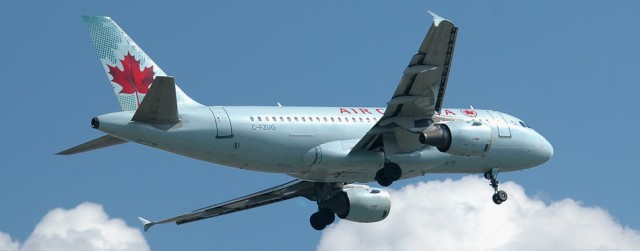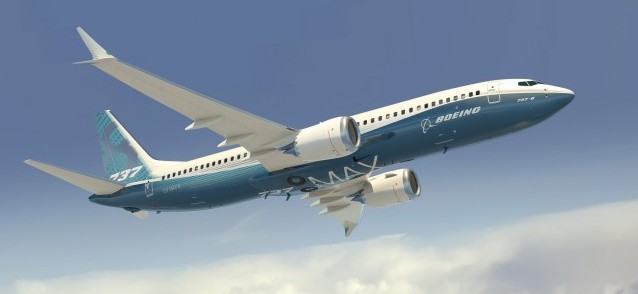Today, Air Canada, in a surprising move, has decided to replace their current Airbus narrowbody fleet with the offering from the competition – the Boeing 737 MAX.
They have ordered a total of 61 of the aircraft, with 33 going to the MAX 8 and 23 to the larger MAX 9. The “up to 109” part of the transaction comes from 30 purchase rights and 18 options. At list prices, the firm orders would be a transaction of over six billion dollars, but you better believe that the airline made a stellar deal for the planes.
“We are pleased to announce our agreement with Boeing for the purchase of 737 MAX aircraft as part of the ongoing modernization of Air Canada’s fleet,” said Calin Rovinescu, President and CEO of Air Canada. “Renewal of our North American narrowbody fleet with more fuel efficient aircraft is a key element of our ongoing cost transformation program and the enhanced passenger cabin comfort provided by the Boeing MAX will help us to retain Air Canada’s competitive position as the Best Airline in North America. Our narrowbody fleet renewal program is expected to yield significant cost savings. We have estimated that the projected fuel burn and maintenance cost savings on a per seat basis of greater than 20 per cent will generate an estimated CASM reduction of approximately 10 per cent as compared to our existing narrowbody fleet.”
By 2019, Air Canada plans to have an all Boeing long-haul fleet, and a majority Boeing short-to-medium haul fleet. Currently, the airline operates a fleet of 27 Airbus A319s, 36 A320s and 10 A321s.

How will Air Canada go about replacing their Airbus A319s? – Image: Caribb
“We’re honored that Air Canada chose Boeing to lead its fleet renewal plan,” said Brad McMullen, vice president of North America Sales, Boeing Commercial Airplanes. “We know the 737 MAX will provide the airline and its customers with an experience that can’t be matched.”
As early as Tuesday of this week, it was reported that Air Canada was going to give their narrowbody dollars to Airbus for a mixture of A320NEO and A321NEO.
What is noticeably absent from both Requests For Proposals (RFP) is the replacement for the Airbus A319. Whether Air Canada will be issuing a follow-on RFP or abandoning that size of aircraft is unknown. It will be interesting to see what happens.
Another point of interest from the press release deals with their current fleet of Embraer 190s.
“The E190 aircraft exiting the fleet will be initially replaced with larger narrowbody leased aircraft until the airline takes delivery of the Boeing 737 MAX aircraft.”
One wonders what these larger aircraft will be. It seems unlikely that Air Canada would take new C-series aircraft, but there is a good supply of leasable 737-700s and 737-800s on the market. Perhaps this is what Air Canada is referring to.
Air Canada, at the moment, operates 86 Airbus narrowbodies. This order of 61 confirmed planes would leave a gap in the fleet of 25 aircraft; however, when purchase rights and options are included, it is clear that there is the opportunity for expansion
Regardless, congratulations to Boeing and Air Canada – the 737 MAX will look great in the Air Canada livery.

seems somewhat obvious to me that Air Canada would want to replace the 319 with the “hometown” bombardier CSeries aircraft…
Well that’s interesting, congratulations to Boeing. I wonder which Govt Minister will get the ‘kickbacks’ this time round…
In the news story, Air Canada said they would decide on their Embraer/A319 replacement in the next six months. Bombardier (C Series), Embraer (E2) and Boeing (MAX 7) are all in the running.
This is a huge blow for Airbus. I am convinced tough that Air Canada received a substantial discount from the list price from Boeing. Regarding the smaller planes they apparently are dismissing the E190 (and they will probably do the same with the A319) and I belive that they will soon place an order for the C Series.
Didn’t see this coming – I though Airbus would get the order. I wonder how much Boeing buying some of the E90s off AC helped to seal the deal.
AC is now in a small club of airlines ditching A32X for 737…
A pilot I know told me AC’s Embraer jets have had significant ongoing operational issues. They were designed in tropical Brazil and can’t seem to handle the temperatures typical of a Canadian winter.
Conversely, Bombardier’s CRJ doesn’t perform as well in hot climates because the air conditioning systems (designed in Montreal) can’t handle the heat!
Like others, my guess is AC will replace the A319s and Embraers with C-series jets. The government is weak politically in Quebec and will no doubt pressure AC to buy the local brand as payback for the support the airline has received over the last few years.